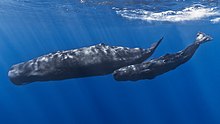Sperm whale
| Sperm whale | |
|---|---|
 |
|
 |
|
| Scientific classification | |
| Kingdom: | Animalia |
| Phylum: | Chordata |
| Clade: | Synapsida |
| Class: | Mammalia |
| Order: | Artiodactyla |
| Infraorder: | Cetacea |
| Family: | Physeteridae |
| Subfamily: | Physeterinae |
| Genus: |
Physeter Linnaeus, 1758 |
| Species: | P. macrocephalus |
| Binomial name | |
|
Physeter macrocephalus Linnaeus, 1758 |
|
 |
|
| Major sperm whale grounds | |
| Synonyms | |
|
Physeter catodon Linnaeus, 1758 |
|
Physeter catodon Linnaeus, 1758
Physeter australasianus Desmoulins, 1822
The sperm whale (Physeter macrocephalus), or cachalot, is the largest of the toothed whales and the largest toothed predator. It is the only living member of genus Physeter, and one of three extant species in the sperm whale family, along with the pygmy sperm whale and dwarf sperm whale of the genus Kogia.
Mature males average 16 metres (52 ft) in length but some may reach 20.5 metres (67 ft), with the head representing up to one-third of the animal's length. Plunging to 2,250 metres (7,382 ft), it is the second deepest diving mammal, following only the Cuvier's beaked whale. The sperm whale's clicking vocalization, a form of echolocation and communication, may be as loud as 230 decibels (re 1 µPa at 1 m) underwater. It has the largest brain of any animal on Earth, more than five times heavier than a human's. Sperm whales can live for more than 60 years.
The sperm whale can be found anywhere in the open ocean. Females and young males live together in groups while mature males live solitary lives outside of the mating season. The females cooperate to protect and nurse their young. Females give birth every four to twenty years, and care for the calves for more than a decade. A mature sperm whale has few natural predators, although calves and weakened adults are sometimes killed by pods of orcas.
From the early eighteenth century through the late 20th, the species was a prime target of whalers. The head of the whale contains a liquid wax called spermaceti, from which the whale derives its name. Spermaceti was used in lubricants, oil lamps, and candles. Ambergris, a waste product from its digestive system, is still used as a fixative in perfumes. Occasionally the sperm whale's great size allowed it to defend itself effectively against whalers. The species is now protected by a whaling moratorium, and is currently listed as vulnerable by the International Union for the Conservation of Nature and Natural Resources (IUCN).
...
Wikipedia

